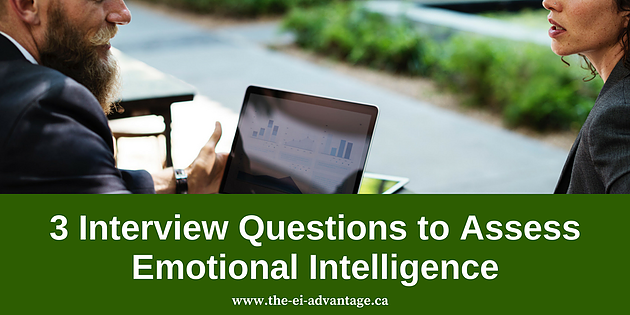Blog
3 Interview Questions to Assess Emotional Intelligence
August 23, 2017

One of the biggest indicators of success in the workplace is the ability to build lasting relationships, empathize with others, and manage emotions in healthy and constructive ways.
This is especially true for employees who are in customer or client-relations roles, where traits like well-developed Emotional Intelligence can mean the difference between productive and long-lasting relationships and ones that are stressful and could end badly.
As a result, agencies and recruitment firms who are tasked with seeking out new talent need to pay close attention to a candidate’s EQ, since it is one of the strongest indicators of potential success.
Why Does Emotional Intelligence Matter?
Individuals who have well-developed Emotional Intelligence are ideal employees because they can easily relate to their colleagues, clients, and customers, and are significantly more adaptable to new challenges and changes within the workplace. People who have low EI might have difficulty managing interpersonal relationships within the office, and those challenges could affect how they interact with clients or customers, as well. Not only could this lead to potential conflicts within the workplace, but it could also leave employees feeling burnt-out and unmotivated.
According to findings from Leadership IQ, 23% of new employees who fail to meet expectations during their first 18 months on the job fail to do so because they have low Emotional Intelligence.
We know that hiring for Emotional Intelligence is critical for today’s modern workplace, but what should HR Managers, recruiters, and department heads be looking for when assessing a candidate’s EI or EQ in an interview? Let’s explore:
“Tell me about a time you tried something and failed.”
Asking a candidate to explain a failed project or pursuit is a great way to see how they view failure, and how they handle situations that don’t turn out as planned. Their response is also a strong indicator of how readily they can take responsibility for their actions and admit to making mistakes.
What to look for:
Look for a candidate who can describe a recent failure in a straightforward and honest manner, and who doesn’t try to blame others or shift the focus to outside circumstances or influences. It’s critical to note that even if external factors were at play that the candidate still holds themselves accountable and can discuss challenging details in a fair and balanced manner.
Emotionally Intelligent candidates can confidently articulate challenges and failures without negatively affecting their self-esteem, which is a good indicator that confidence will help them assess situations objectively and refrain from becoming frustrated and lashing out at their peers when things go wrong.
“Tell me about a time you received negative feedback from a superior. How did it make you feel?”
One of the easiest ways to determine if someone has high Emotional Intelligence is to assess how they deal with criticism. Candidates with high EQ can handle negative feedback without losing their stride, and don’t allow criticism to negatively affect their self-worth and performance in the workplace.
What to look for:
Look for a candidate who can articulately describe their feelings when they received the negative feedback. Keep an ear open for specifics, such as: “I was surprised that my manager was was unhappy with my work, and it was frustrating to hear at the time. However, I was able to use that feedback to pay attention to several key areas she felt I was missing, which helped me meet our client’s expectations more quickly.”
Look for a response that specifically acknowledges the emotions they experienced at the time, and that demonstrates an empathetic understanding of their manager’s point of view.
On the other hand, candidates who simply state that they “felt bad” or can’t articulate why the feedback affected them might not be as emotionally intelligent as other candidates, and might experience challenges putting themselves in someone else’s shoes in the future.
“Can you tell me about a time when you needed to ask for help on a project?
Emotionally Intelligent individuals are self-confident without being egotistical, and have a realistic understanding of their own strengths and weaknesses. A strong candidate should be able to admit what they don’t know, and be comfortable asking for help and working closely with others when necessary.
What to look for:
Emotionally intelligent candidates will be upfront and transparent about their weaknesses and will articulate their desire to better themselves by working with others and taking advantage of any of the resources available to them within the workplace.
Watch out for candidates who seem embarrassed or hesitant to admit that they need help from time to time, and instead focus on hiring candidates who can discuss situations where they sought the help of a manager or colleague to fill a gap in their knowledge and solve a problem.
For more information about hiring emotionally intelligent candidates, get in touch and ask us about how EI training can benefit you and your workplace.
